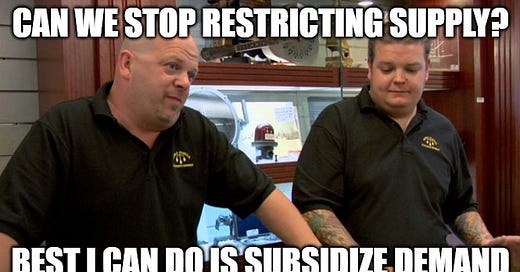Keeping up with the FITs, 5/21
The Zvi spreads a meme that I started; Josh Barro, Bari Weiss and others on media; Russ Roberts and Marc Andreessen, who spreads my meme;
Last week I chronicled that there is a shortage of baby formula, especially specialized baby formula, due to a combination of the same reasons that hold whenever there is a shortage of anything.
The playbook never changes. Restrict supply and subsidize demand.
This meme depicts a theory of political economy known as Public Choice, and I am pretty sure that I started it. I did not start Public Choice, but I take credit for the particular formulation of “subsidize demand, restrict supply.”
I didn’t have a graphic. But in my 2016 book Specialization and Trade, in the chapter called “Policy in Practice,” I wrote,
The policy pattern that consists of subsidized demand and restricted supply is not limited to the housing market. It pervades government regulation of industry. . .
From the standpoint of the theory of market failure, the subsidized-demand, restricted-supply model almost never makes sense. If a market failure results in underproduction of a good, then it makes sense to subsidize both demand and supply. If a market failure results in overproduction, then it makes sense to restrict both demand and supply. . .
However, from the standpoint of another theory, called public choice, in which government policy tends to serve concentrated interests. . .The pattern of subsidized demand and restricted supply is what you would expect to result from interest-group politics in a specialized economy.
Back in 2019, Tyler Cowen gave me a shout-out and spread the word. And now, it’s a meme!
Josh Barro talks with Bari Weiss, Jeffrey Goldberg, Jim VandeHei, and Rashida Jones.
Barro says,
But the problem is, it's sort of similar to the problem that you have in the Biden administration, where Biden has not been able to fully staff up with a set of people who share his vision of what Democratic Party politics should be. He's been overrun, in certain cases, by this more ideologically narrow set in the party that is very focused on these college-educated voters with a particularly progressive set of views. In general, and especially on social issues, you're seeing the same phenomenon in the newsrooms. . .you have a lot of other outlets that are not making money, that are doing sort of replacement level progressive takes, the Vox style stuff, that you cannot charge for because every other outlet has the same stuff. Why pay for it when you can get it for free? And that just serves a market that's massively oversaturated. Because you have this small subset of the country doing most of the writing, basically writing for itself — what they're looking for is really overserved. And then there are a lot of things that are underserved.
In a Russ Roberts podcast, Marc Andreessen says,
When you look at how the government tries to help in these three sectors, right, what you see basically is the same pattern in each of the three sectors. And, it has two parts. And, the two parts are restriction of supply and subsidies of demand.
The Public Choice meme strikes again! Also, around minute 41 Marc says that if the Internet had native money, then there could be micropayments, and this would stop spam. If it cost 1/1000 of a cent to send email, ordinary people could afford it easily, but spammers would be driven out of business. Self-recommending.





An old Slate Star Codex post on cost disease from 2017 features a comment that includes you: https://slatestarcodex.com/2017/02/17/highlights-from-the-comments-on-cost-disease/. It begins, "I think you gave short shrift to libertarian explanations of this phenomena. In particular, the Kling Theory of Public Choice may explain a significant fraction of cost disease: public policy will always choose to subsidize demand and restrict supply . . ."
"Public Choice" is a terrible name, unfortunately. It should be "Government Choice". It's only barely true that the public has a choice - all the decisions taken, chosen, are done by the government. (for the government).
"It emerged in the fifties and received widespread public attention in 1986, when James Buchanan, one of its two leading architects (the other was his colleague Gordon Tullock), was awarded the Nobel Prize in economics."
Gov't choice, gov't schools, gov't buildings, gov't ownership (of nearly 50% of the West). And virtually all of the Government Choice theory applies to dictatorships and quasi dictatorships and oligarchies - since they all develop gov't bureaucracies.
Like you say, because of special interests, who care more (especially Dems), the gov't usually subsidizes demand, and restricts supply.